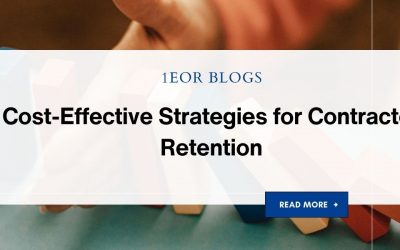In today’s hyper-competitive job market, businesses must think beyond traditional hiring strategies to attract and retain top talent. Leveraging RPO for Effective Talent Pipeline Management is a game-changer for organizations seeking a continuous flow of qualified candidates. Recruitment Process Outsourcing (RPO) offers companies an efficient, scalable, and strategic solution to overcome talent shortages, reduce hiring costs, and ensure business sustainability.
Gone are the days when hiring was a reactive process. Modern businesses must proactively build and manage a talent pipeline that aligns with their long-term goals. That’s where RPO providers step in, bringing data-driven recruitment strategies, advanced sourcing techniques, and deep industry expertise to optimize the hiring process. In this article, we explore how RPO solutions help organizations enhance their talent acquisition strategy, improve employer branding, and maintain a steady supply of skilled professionals. Take your talent pipeline to the next level with RPO solutions powered by 1EOR—streamline hiring, reduce costs, and secure top talent effortlessly. Don’t let recruitment bottlenecks slow you down—partner with 1EOR today and build a workforce that drives success!
Understanding RPO and Its Role in Talent Pipeline Management
Recruitment Process Outsourcing (RPO) is a specialized hiring strategy where an external provider manages all or part of an organization’s recruitment process. Unlike traditional staffing agencies that focus on filling individual roles, RPO providers take a holistic approach, optimizing talent pipeline management to ensure businesses have access to high-quality candidates at all times.
Here’s how Leveraging RPO for Effective Talent Pipeline Management transforms recruitment:
- Proactive Talent Sourcing – Instead of waiting for vacancies to arise, RPO providers continuously identify and engage with potential candidates, ensuring a ready pool of talent.
- Employer Branding Enhancement – RPO services help companies build a strong employer brand, making them attractive to top-tier candidates.
- Data-Driven Decision Making – RPO firms leverage AI-driven analytics, market insights, and predictive hiring models to refine recruitment strategies.
- Scalability & Flexibility – RPO solutions adapt to business needs, whether scaling up hiring during peak seasons or reducing costs during slower periods.
- Diversity & Inclusion – A structured RPO strategy ensures fair hiring practices, promoting workplace diversity and inclusivity.
By integrating RPO into talent pipeline management, companies gain a competitive edge, ensuring their workforce is always equipped to meet business demands.
Building a Sustainable Talent Pipeline with RPO
The core of a successful recruitment strategy lies in building a sustainable talent pipeline—a structured approach that ensures an ongoing supply of qualified candidates for current and future job openings. RPO providers play a crucial role in making this happen by implementing targeted sourcing strategies, nurturing passive candidates, and leveraging predictive hiring models.
A well-managed talent pipeline consists of:
- Workforce Planning: RPO specialists assess current and future hiring needs based on business goals and market trends.
- Strategic Sourcing: Using multi-channel sourcing (social media, job boards, industry events, referrals), RPO firms ensure a diverse candidate pool.
- Talent Engagement: Passive candidates are engaged through personalized communication, networking events, and digital outreach.
- Skills Assessment & Pre-Screening: Candidates undergo rigorous evaluation, including technical assessments and behavioral interviews, to ensure a strong cultural fit.
- Candidate Relationship Management (CRM): RPO firms maintain long-term relationships with potential hires, keeping them engaged until the right opportunity arises.
Through Leveraging RPO for Effective Talent Pipeline Management, businesses can eliminate last-minute hiring rushes and secure the best talent without compromising on quality or time.
Key Benefits of RPO in Talent Pipeline Development
Leveraging RPO for Effective Talent Pipeline Management provides businesses with numerous advantages beyond traditional recruitment methods. Companies that adopt RPO strategies experience:
1. Faster Hiring and Reduced Time-to-Fill
A well-structured RPO model significantly cuts down hiring timelines by maintaining an active pool of pre-vetted candidates. Businesses no longer struggle with vacant roles that impact productivity.
2. Cost-Effective Recruitment Process
Unlike traditional hiring models, RPO services optimize recruitment costs by reducing the dependency on expensive job advertisements, third-party agencies, and prolonged hiring cycles.
3. Enhanced Candidate Quality
RPO firms utilize AI-powered screening tools, structured interviews, and market intelligence to ensure that only the most suitable candidates are shortlisted.
4. Improved Employer Branding
A strong employer brand attracts top talent. RPO providers help businesses craft compelling job descriptions, manage career portals, and implement engagement strategies that enhance their market reputation.
5. Future-Proof Workforce Strategy
By continuously engaging with high-potential candidates, RPO firms help organizations mitigate talent shortages, ensuring they always have the right people for the right roles.
Table: Traditional Recruitment vs. RPO-Driven Talent Pipeline Management
| Aspect | Traditional Recruitment | RPO-Driven Talent Pipeline |
| Hiring Approach | Reactive (when a vacancy arises) | Proactive (ongoing candidate engagement) |
| Time-to-Hire | Longer due to sourcing and screening delays | Faster with pre-screened talent pools |
| Cost Efficiency | High due to job ads and agency fees | Optimized with data-driven hiring |
| Candidate Quality | Variable, often rushed | High-quality, AI-vetted candidates |
| Employer Branding | Limited impact | Strong employer positioning |
Implementing an RPO Strategy for Effective Talent Pipeline Management
Successfully Leveraging RPO for Effective Talent Pipeline Management requires a structured approach tailored to an organization’s specific hiring needs. Implementing an RPO strategy involves multiple steps, ensuring businesses reap maximum benefits from outsourced recruitment solutions.
1. Define Hiring Objectives and Workforce Goals
Before integrating RPO services, organizations must outline their short-term and long-term hiring goals. This includes assessing workforce demands, identifying skill gaps, and forecasting talent needs based on business expansion plans.
2. Choose the Right RPO Model
RPO is not a one-size-fits-all solution. Businesses must select an RPO model that aligns with their recruitment needs:
- End-to-End RPO – A complete outsourcing model where the provider manages the entire recruitment process.
- Project-Based RPO – Used for short-term or high-volume hiring needs.
- Selective RPO – Businesses outsource only specific recruitment functions, such as sourcing or screening.
3. Leverage Advanced Recruitment Technologies
The best RPO providers utilize AI-driven talent analytics, predictive hiring models, and automated candidate tracking systems (ATS) to optimize recruitment. These technologies streamline screening, enhance decision-making, and improve overall hiring efficiency.
4. Implement a Strong Candidate Engagement Strategy
Engagement is key to talent pipeline management. RPO firms maintain regular communication with passive candidates, offering industry insights, career development resources, and networking opportunities to keep them interested in future opportunities.
5. Monitor and Optimize Performance Metrics
Tracking key recruitment performance indicators (KPIs) ensures that the RPO strategy delivers tangible results. Some essential metrics include:
- Time-to-fill – The duration it takes to close a position.
- Quality of hire – The performance and retention rate of new hires.
- Candidate satisfaction – Feedback from applicants about the recruitment process.
- Cost per hire – The total expenditure on acquiring new employees.
A data-driven approach helps businesses fine-tune their RPO strategy, ensuring continuous improvement in talent acquisition efforts.
Challenges and Solutions in RPO-Driven Talent Pipeline Management
While Leveraging RPO for Effective Talent Pipeline Management offers numerous advantages, businesses may encounter challenges that require strategic solutions.
1. Resistance to Change
Many organizations hesitate to outsource recruitment due to concerns about losing control over hiring decisions. The solution? Businesses should collaborate closely with RPO providers, setting clear expectations and maintaining transparent communication.
2. Ensuring Cultural Fit in Hiring
An external RPO firm may struggle to understand the company’s culture. To resolve this, organizations must train RPO teams on corporate values, work environment, and employer branding to ensure alignment with hiring goals.
3. Maintaining Candidate Experience
A poor candidate experience can harm employer reputation. RPO solutions should focus on personalized interactions, timely communication, and feedback mechanisms to enhance candidate engagement.
4. Managing Talent Pipeline for Niche Roles
Some industries require specialized skills that are hard to source. Here, RPO firms leverage industry-specific hiring expertise, AI-driven market research, and networking with niche talent communities to build a strong pipeline.
By proactively addressing these challenges, businesses can fully capitalize on RPO-driven talent pipeline management to sustain workforce growth and efficiency.
Future Trends in RPO and Talent Pipeline Management
As the job market evolves, so do RPO strategies. Emerging trends are reshaping how businesses approach talent pipeline management, ensuring they stay ahead in an increasingly competitive landscape.
1. AI-Driven Recruitment Automation
Artificial Intelligence (AI) is revolutionizing RPO by automating resume screening, chat-based candidate engagement, and predictive hiring analytics. Businesses that integrate AI into RPO strategies gain a faster, more efficient recruitment process.
2. Data-Driven Workforce Planning
With real-time data analytics, RPO providers can predict hiring trends, analyze workforce gaps, and make proactive talent acquisition decisions that align with market demands.
3. Employer Branding & EVP (Employee Value Proposition)
Future RPO solutions will focus heavily on employer branding, helping businesses craft compelling Employee Value Propositions (EVPs) that attract high-caliber professionals.
4. Diversity, Equity, and Inclusion (DEI) Initiatives
Companies are prioritizing diverse and inclusive hiring. RPO providers implement bias-free recruitment strategies, ensuring fair and equal hiring opportunities across all levels.
5. Hybrid & Remote Workforce Solutions
The rise of remote work has changed hiring dynamics. RPO firms now focus on sourcing global talent, ensuring companies have access to highly skilled professionals, regardless of location.
These trends indicate that RPO-driven talent acquisition will continue evolving, making it a crucial strategy for organizations aiming to secure top talent efficiently.
Conclusion: Why RPO is the Future of Talent Pipeline Management
In today’s dynamic business environment, Leveraging RPO for Effective Talent Pipeline Management is no longer an option—it’s a necessity. Companies that rely solely on traditional recruitment methods risk falling behind in the talent race. RPO providers bring innovation, expertise, and scalability to hiring strategies, ensuring businesses maintain a steady supply of skilled professionals.
By adopting a structured RPO approach, organizations benefit from:
✔ Faster and cost-effective hiring processes
✔ Proactive workforce planning and future-proofing
✔ Enhanced employer branding and candidate experience
✔ Advanced AI-driven recruitment and predictive analytics
✔ Access to a high-quality, pre-vetted talent pool
In an era where talent shortages can disrupt business growth, RPO solutions provide a strategic advantage. Companies that embrace RPO for talent pipeline management will not only fill job vacancies efficiently but also build a resilient workforce prepared for future challenges.
Now is the time to leverage RPO strategies and secure your organization’s success in a competitive talent landscape!


